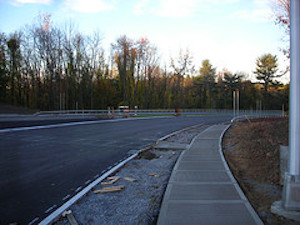
Congress postpones insolvency, but uncertainty still plagues the Highway Trust Fund’s future

The last-minute patch to the Highway Trust Fund that Congress enacted on the way out the door last week delayed immediate insolvency, but it hardly ends the uncertainty for states or addresses our nation’s long-term prospects.
The House ultimately won the debate with the Senate over the length and funding source for the patch, using the controversial gimmick known as “pension smoothing” and temporarily postponing insolvency until next May. The Senate had passed a patch earlier in the week with enough money (but no pension smoothing) to carry the fund to the end of the year, which could have set the stage for a long-term solution in the lame-duck session.
“Congress is rapidly running out of last-minute budget gimmicks to patch holes in America’s key infrastructure fund, and must immediately begin the task of replacing pretend dollars with the real money necessary to continue to call ourselves a first-world nation,” said James Corless, T4America’s director, in our full statement released after final passage in the Senate. “In truth, they have bought themselves only a few short months to grapple with an issue they have delayed for years.”
Without this patch, the U.S. Department of Transportation was just days away from beginning to slash reimbursements to states for their current projects. However, with only ten months of full funding promised — if it stretches that far — some states are still shelving projects. Take, Tennessee, for example:
“Because of the uncertainty concerning the future of the Highway Trust Fund, the department took a conservative approach with the projects in this year’s three year transportation improvement program,” said Tennessee Department of Transportation’s Jennifer Flynn in a story yesterday about projects still being delayed there, despite last week’s action. “The most recent program included no new construction starts, and there were many projects throughout the state that did not move forward based on available funding.”
Department of Transportation Secretary Anthony Foxx has been pushing Congress for a long-term funding solution almost since his tenure began as Secretary.
“The good news is that Congress has avoided bankrupting the Highway Trust Fund,” Secretary Foxx said in his news release following the vote. “The bad news is that there is still no long-term certainty, and this latest Band-Aid expires right as the next construction season begins.”
So what happens next? Assuming Congress punts on the issue during the lame-duck period, a lot could be determined by the political makeup of the next Congress May, as well as other big issues early in the next Congress, including raising the debt ceiling again.
Last week, Senator Mike Lee (R-UT) found 28 fellow Republicans who would vote to defund the nation’s transportation system except for a small Interstate maintenance fund, and leave it to states to make up for the lost funding.
It would be a massive hole to fill for states and localities. Many already are struggling to raise additional revenue to make ends meet while Congress continues kicking the can down the road. Would they have the ability or political will to raise the equivalent of millions (or billions) in lost federal revenue? And what would happen to our country if the feds walked away from the national interest in our transportation system that spans multiple modes, state borders and moves goods and people across jurisdictional boundaries every day?
Other GOP members appeared to have grave doubts about such a strategy, and instead argued forcefully for shoring up the program for the long haul.
We believe most Americans would prefer to see our nation continue to make first-world levels of investment in our infrastructure – particularly if more of it comes to their communities to solve their local issues and address their priorities. That’s why we’re fighting for a long-term funding solution that gives local communities more resources and latitude, while ensuring that our bridges, roads and transit networks remain strong and safe across the nation.



